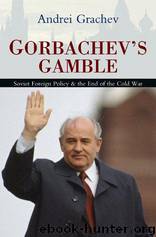Gorbachev's Gamble by Grachev Andrei;

Author:Grachev, Andrei;
Language: eng
Format: epub
Publisher: Polity Press
4
UP TO THE PEAK AND DOWN THE SLOPE
Gorbachev’s ‘Anti-Fulton’ Speech at the UN
Gorbachev’s speech at the UN General Assembly on 7 December 1988 received a standing ovation and truly can be described as a manifesto of ‘new thinking’, proclaimed urbi et orbi. It was not only a question of its content and style, which represented a clear departure from traditional communist ideology as well as typical Soviet phraseology. According to Hans-Dietrich Genscher, ‘the speech was in the spirit of Hans Jonas, a great German/American philosopher, who was compelled to leave Germany in the 1930s because he was a Jew. His book The Imperative of Responsibility taught us to understand that our responsibility extends beyond everyday routine, that we are responsible for the future.’1
In an address so different from the propaganda rhetoric of his predecessors, Khrushchev and Brezhnev, the Soviet leader hardly bothered to confirm the ‘peace-loving goals’ of Soviet foreign policy. Outlining the new principles that would govern his country’s relations with the outside world, he talked in terms of concrete action, announcing deep unilateral troop cuts (half a million soldiers) and arms reductions along with the withdrawal of six tank divisions from Eastern Europe. In this way he publicly made it crystal clear that the ‘Brezhnev Doctrine’ was dead.2
Gorbachev solemnly declared the Soviet leadership’s intention to respect ‘freedom of choice’ for all peoples to determine their own political and economic systems, and he appealed to all members of the international community to renounce the use of force in the settlement of international disputes. ‘Force and the threat of force cannot be and should not be an instrument of foreign policy. . . . Freedom of choice is . . . a universal principle, and it should know no exceptions.’3
Throughout the world, the speech was headline news. Its key elements, however, had already been formulated by Gorbachev in 1987 and were formally endorsed in the summer of 1988 at the 19th Party Conference in June/July. Convened at a critical stage in the development of perestroika, the Conference was intended to clarify the course of reforms, apparently stalled, and to clear up the ambiguity that con tinued to cloud the long-term orientation of the project. Addressing Party activists (as well as the general public, since the proceedings of the Conference were broadcast live by the main Soviet TV channels), Gorbachev outlined his proposals for the radicalization of reform, expecting to obtain from the Conference a mandate to embark on the democratic transformation of the Soviet political system. However, the political direction he was proposing to the Party nomenklatura almost inevitably led to a fragmentation of the heterogeneous coalition of the first supporters of perestroika that initially had assured widespread support for Gorbachev within the Soviet political elite.
If for Gorbachev, Yakovlev, Shevardnadze, Chernyaev and other liberal elements within the academy or the world of the Moscow intelligentsia it meant a real democratization of political life and above all a definitive rejection of the Bolshevik model of socialism, the majority of top Party,
Download
This site does not store any files on its server. We only index and link to content provided by other sites. Please contact the content providers to delete copyright contents if any and email us, we'll remove relevant links or contents immediately.
| Arms Control | Diplomacy |
| Security | Trades & Tariffs |
| Treaties | African |
| Asian | Australian & Oceanian |
| Canadian | Caribbean & Latin American |
| European | Middle Eastern |
| Russian & Former Soviet Union |
The Secret History by Donna Tartt(16652)
The Social Justice Warrior Handbook by Lisa De Pasquale(11492)
Thirteen Reasons Why by Jay Asher(7797)
This Is How You Lose Her by Junot Diaz(5791)
Weapons of Math Destruction by Cathy O'Neil(5045)
Zero to One by Peter Thiel(4832)
The Myth of the Strong Leader by Archie Brown(4795)
Promise Me, Dad by Joe Biden(4453)
Beartown by Fredrik Backman(4429)
Stone's Rules by Roger Stone(4421)
How Democracies Die by Steven Levitsky & Daniel Ziblatt(4407)
The Fire Next Time by James Baldwin(4349)
100 Deadly Skills by Clint Emerson(4084)
A Higher Loyalty: Truth, Lies, and Leadership by James Comey(4038)
Rise and Kill First by Ronen Bergman(4017)
The David Icke Guide to the Global Conspiracy (and how to end it) by David Icke(3890)
The Farm by Tom Rob Smith(3878)
Secrecy World by Jake Bernstein(3787)
The Doomsday Machine by Daniel Ellsberg(3736)
